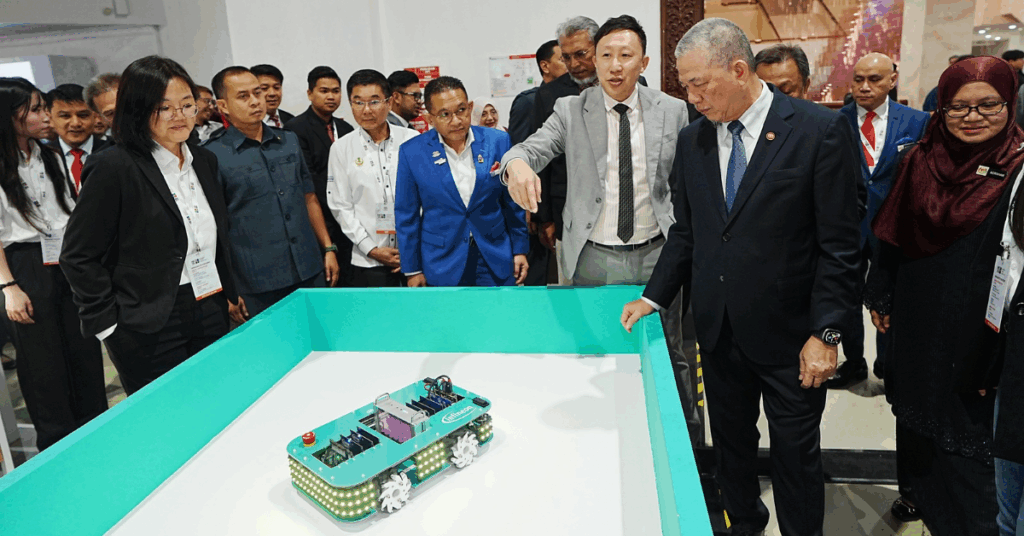
[This is a sponsored article with Malaysian Research Accelerator for Technology and Innovation (MRANTI).]
At first glance, the National Innovation and Commercialisation Expo (NICE) 2025 is everything you expect of a large-scale exhibition.
You had the crowded booths, bright banners, and exciting conversations filling the halls of World Trade Centre Kuala Lumpur. But beneath all that bustle was something deeper taking shape.
From October 6 to 9, participants and exhibitors from the innovation, academic, and industrial sectors gathered under the theme “Innovation. Growth. Global Impact.” to bridge the gap between lab-grown ideas and global markets.
Organised by the Ministry of Science, Technology and Innovation (MOSTI) and implemented by MRANTI, the expo saw high-value deals, award-winning innovations, and homegrown technologies that proved Malaysia’s R&D scene is more commercially driven than ever.
Some of the exhibitors included:
- Xiamen University Malaysia, whose booth focused on bio-based chemical production, circular agro-waste valorisation, bioenergy innovation, and AI-enabled bioprocess systems.
- Agensi Angkasa Malaysia (MYSA), promoting its functions and services in space and national-space agenda (“Angkasa untuk semua, Space for all” which references Malaysia Space Exploration 2030).
- Infra Mobile Digital, an AI tech consultancy firm that showcased its SERO-AI data hub for operational efficiency, data management, and seamless digital experiences.
NICE 2025 also marked the official rollout of Malaysia’s RDICE Action Plan, a strategic framework aligning R&D, innovation, commercialisation, and enterprise towards a unified national ecosystem.
If you missed it, here are three key insights about creating impactful tech from NICE 2025 that Malaysian innovators should know.

1. We need to own our intelligence before it owns us
Everywhere you look, AI is creeping into our lives. It’s in our phones, our offices, and even our decisions. A crucial question to ask is—what happens when machines don’t just process instructions, but act on their own?
Chee Mun Foong, CPO of Ryt Bank (Malaysia’s first AI-powered digital bank) and CEO of YTL AI Labs, emphasised understanding the fundamentals of AI agents.
He highlighted three key pillars that form the foundation of AI’s revolution towards autonomy: intelligent systems, the rapid advancement of autonomous systems, and their widespread impact in the world.
Dictionary time: Unlike AI models, which typically require direct input to perform a task, AI agents can work independently and take initiative without constant human guidance.

As AI agents continue to reshape major industries like banking, Chee underscored the importance of building and owning local AI systems. Otherwise, he argues that the nation risks being led by systems not designed for our people and values.
By developing our own AI capabilities, Malaysia is building technological resilience and independence, thereby ensuring that we have our own intelligence to rely on.

2. Technology can guide us, but humanity must lead
Aside from banking, AI is also rewriting the rules of medicine. As algorithms get smarter, though, healthcare leaders are more concerned with finding a balance between human interaction and automation.
Dr Ahmed Serag, a seasoned AI expert with nearly two decades of experience, reminded that AI should make healthcare more human. “Because at its core, medicine is about empathy and technology should never take that away.”
He stressed that the future of AI in medicine cannot be built in silos. “Academia provides the depth behind the science, startups drive agility and innovation while healthcare systems ensure responsible implementation. Each is a complementary force; together, they define the ecosystem.”

Professor Dato’ Dr. Adeeba Kamarulzaman, CEO and President of Monash University Malaysia, echoed a similar sentiment and emphasised how Malaysia must broaden AI’s role in healthcare while ensuring no one is left behind.
Without diverse and representative datasets, AI tools risk perpetuating global biases. She urged the nation to invest in inclusive, locally grounded medical data and to co-design technology with Malaysians.
In short, the race to digitalise healthcare means little if progress leaves people behind.
3. The next harvest depends on the next generation

Food security may sound like an old challenge, but it’s becoming a new kind of crisis.
Malaysia currently ranks 57th on the Global Food Security Index, reflecting our heavy dependence on food imports and vulnerability to climate-related disruptions.
Prof. Dr. Rofina Yasmin (Chairman of MRANTI), Dr. Muhammad Faheem of the Centre for Agriculture and Bioscience International (CABI), and Azizul Julirin (Founder of Aquafarm), pointed out that the solution isn’t just more machinery.
We need to reframe agriculture as a viable and sustainable career path for the youth. Emerging technologies are already transforming how food is grown and distributed, but without a new generation of digital-savvy farmers and entrepreneurs, these advances won’t take root.

They proposed establishing agri-entrepreneurship incubators and mentorship programmes to nurture young talent, as well as setting up “incubator farms” to welcome newcomers to farming.
If Malaysia wants to feed our people and potential, we have to start giving our youths a reason to get their hands dirty and plant the seeds of the future.
Building a resilient and future-ready economy
NICE 2025 wrapped up on the final day with BioXCeed 2025, Malaysia’s flagship bio-based innovation platform organised by Bioeconomy Corporation in partnership with Malaysian Technology Development Corporation.
With the objective of accelerating local bio-based and technology-driven solutions, the platform offered over RM800 million in investment and commercialisation opportunities across the bio-economy this year.
It featured deep-tech discussions and the launch of six bio-based products by five accelerator companies.
Five MoUs were exchanged at BioXCeed 2025, two of which featured the Bioeconomy Corporation:
- A collaboration with Japan’s Emulsion Flow Technologies for palm-oil-mill effluent (POME) treatment and waste-oil recovery, valued around RM 30 million over five years.
- A large investment commitment of RM700 million from South Korea’s Polaris Bio to develop POME-based biogas upgrading facilities in Malaysia.

In total, 14 MoUs worth over RM910 million were inked throughout NICE 2025. Together, they represent key innovation areas that Malaysia is progressing in and proves investor confidence in homegrown talents.
It also helps that NICE 2025 spotlights this through the Malaysia Commercialisation Year (MCY) Awards. The MCY has supported the commercialisation of 622 innovations, generating more than RM849 million in revenue since 2016.

This year’s awards carried a total cash prize pool of RM1 million in recognition of impactful local research. University Putra Malaysia’s Remdii Ultrasensitive Barrier Repair Cream was crowned the Supreme Award winner.
More than numbers, NICE 2025 was a reminder that innovation is a collective journey. It takes researchers, entrepreneurs, policymakers, and the public working together to build an economy that’s resilient and future-ready.
The momentum doesn’t end here. You too can be a part of shaping Malaysia’s next wave of innovation, check out other MOSTI and MRANTI opportunities here.
“Innovation and embracing change are vital to economic prosperity.”
YAB Dato’ Sri Haji Fadillah Bin Haji Yusof, Deputy Prime Minister
- Learn more about the National Innovation and Commercialisation Expo (NICE) 2025 here.
- Read articles we’ve written about Malaysian startups here.
Featured Image Credit: MRANTI
Last modified: November 25, 2025






